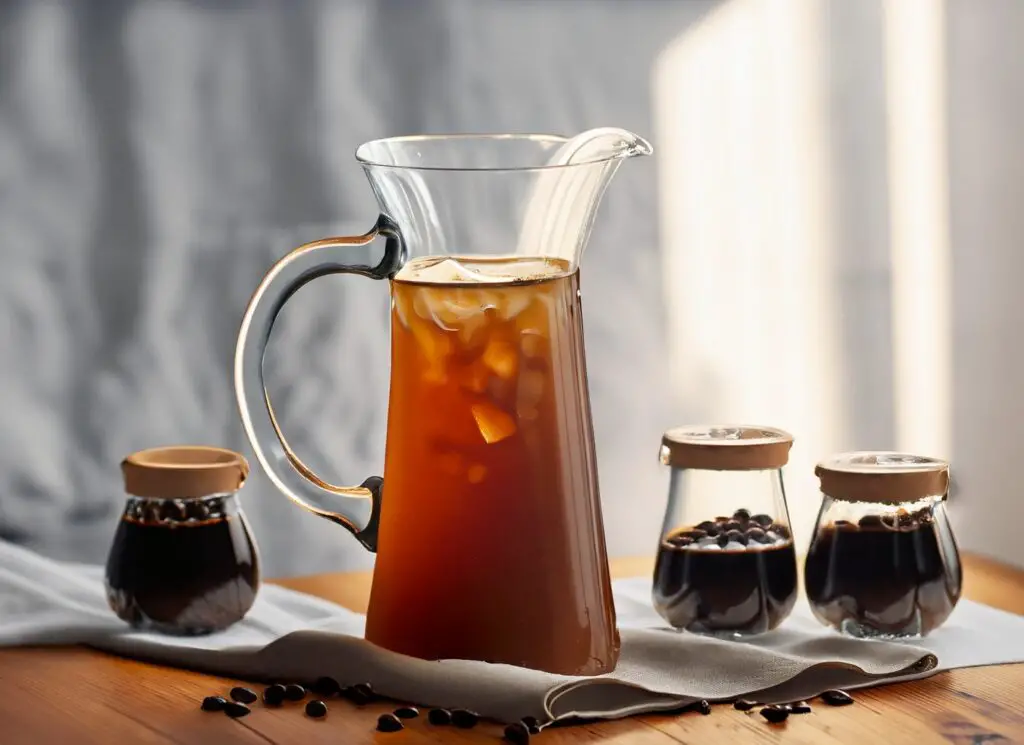As an Amazon Associate CoffeeXplore.com earns from qualifying purchases.
What Coffee to Use in a Cold Brew Maker: Ultimate Guide
Wondering what coffee to use in a cold brew maker? You’re not alone. Whether you’re a seasoned coffee enthusiast or a newcomer to the world of cold brew, the question of which coffee beans to use can be a bit perplexing. Can you use regular ground coffee, or do you need something special?
The best coffee for your cold brew maker is typically a medium or dark roast, coarsely ground for optimal flavor extraction. If you’re asking, “Can you use any coffee for cold brew?” the answer is yes, but some types are better suited for the cold brew process.
Curious to learn more? Stick around. As an expert in coffee and cold brew, I’ll guide you through the maze of options, from the best ground coffee for cold brew to the ideal cold brew ratio. By the end of this article, you’ll be a cold brew aficionado, ready to impress with your full-bodied flavors and low acidity brews.
Key Facts:
- Medium to dark roast coffee beans are recommended for the best cold brew.
- A coarse grind is crucial for optimal flavor extraction.
- The ideal cold brew concentrate-to-water ratio is between 2:1 and 1:1.
- Freshly ground coffee yields the best flavor.
- Using filtered water can significantly improve your cold brew.
What Coffee to Use in a Cold Brew Maker
The importance of choosing the right coffee for cold brew can’t be overstated. The type of coffee you use will significantly impact the flavor, aroma, and overall quality of your brew. So, what’s the best coffee for cold brew Starbucks fans or home brewers alike would recommend? Medium to dark roast coffee beans are your best bet for a flavorful and aromatic cold brew.
Choosing the Best Coffee Beans for Cold Brew

Roast Level: What Makes a Difference?
When it comes to the roast level, medium and dark roasts are generally the go-to options for cold brew. Medium roasts offer a balanced flavor profile, while dark roasts provide a more robust and intense experience. These are your cold brew beans of choice.
Medium Roast: The Balanced Choice
Medium roast coffee beans offer a balanced flavor profile with moderate acidity and a smooth finish. They’re great for those who enjoy a coffee that’s not too strong but still has a good amount of flavor and complexity. Medium roasts are also rich in caffeine, making them a great choice for those looking for a bit of a kick. These are often considered medium roast coffee beans perfect for cold brew.
Dark Roast: For a Robust Flavor
If you’re after a coffee with a strong, bold flavor, dark roast is the way to go. Dark roasts are less acidic and offer a fuller body, making them ideal for those who prefer a more robust cup of coffee. However, they contain slightly less caffeine than medium roasts. These are your dark roast coffee beans for cold brew.
Origin of Coffee Beans: Does it Matter?
The origin of your coffee beans can significantly influence the flavor of your cold brew. Different regions produce beans with unique flavor profiles, ranging from fruity and floral to nutty and full-bodied.
African Coffee: Floral and Fruity
African coffee beans are known for their floral and fruity notes. They offer a unique flavor profile that can add an exotic twist to your cold brew. Ethiopian Yirgacheffe and Kenyan AA are popular choices for those looking to experiment with low acidity coffee beans.
Central American Coffee: Bright and Acidic
Central American coffee beans are generally bright and acidic, offering a clean and crisp cup. Beans from Guatemala and Costa Rica are excellent choices for those who prefer a more traditional coffee flavor.
South American Coffee: Nutty and Full-Bodied
South American coffee beans, particularly those from Colombia and Brazil, are known for their nutty, full-bodied flavors. These beans are a great option for those who prefer a richer, more robust cold brew.
Blend vs. Single Origin: What Should You Choose?
When it comes to choosing between blends and single-origin coffee, it’s all about personal preference. Blends offer a variety of flavors in a single cup, while single-origin coffees provide a pure, unadulterated experience.
Coffee Blends: Variety in a Cup
Coffee blends are made by mixing beans from different regions. This creates a balanced flavor profile that’s often more complex than single-origin coffees. Blends are a great choice for those who enjoy a variety of flavors in their cup.
Single Origins: The Pure Experience
Single-origin coffees are made from beans that come from one specific region. This allows you to experience the unique flavor profile of that particular area. If you’re a coffee purist, single origins are the way to go.
Grinding Your Coffee Beans for Cold Brew
Why Coarse Grind is Crucial
The grind size of your coffee beans plays a significant role in the extraction process. A coarse grind is crucial for making cold brew because it allows for a slower extraction, resulting in a smoother, less acidic brew. If you’re wondering, “Can you use regular coffee in a cold brew coffee maker?” the answer is yes, but a coarse grind is recommended.
Burr Grinder vs. Blade Grinder
When it comes to grinding your coffee beans, the type of grinder you use can make a big difference in the quality of your brew. A burr grinder is generally considered the best option for cold brew.
Using a Burr Grinder: The Professional’s Choice
Burr grinders offer a consistent grind size, which is crucial for making a great cup of cold brew. They’re a bit more expensive but are generally considered the best choice for serious coffee enthusiasts.
Using a Blade Grinder: Budget-Friendly but Risky
Blade grinders are less expensive but offer less consistency in grind size. If you’re on a budget, they can work, but you’ll need to be extra careful to avoid over-grinding your beans.
Brewing Techniques for Cold Brew Coffee
Water Ratio: Finding the Perfect Balance
The water-to-coffee ratio is another crucial factor in making great cold brew. A ratio between 2:1 and 1:1 is generally considered ideal for most people.
Steeping Time: How Long is Too Long?
The steeping time can also impact the flavor of your cold brew. A steeping time of 12 to 24 hours is generally recommended for optimal flavor extraction.
Filtration Methods: Getting the Cleanest Brew
When it comes to filtration, you have a few options. Paper filters offer the cleanest brew, while metal filters allow more oils and fine particles to pass through, giving your cold brew a fuller body.
Tips for Making the Best Cold Brew Coffee
Freshly Ground vs. Pre-Ground Coffee
Using freshly ground coffee can significantly improve the flavor of your cold brew. Freshly ground beans offer a richer, more robust flavor compared to pre-ground coffee.
The Importance of Using Filtered Water
Using filtered water can also make a big difference in the quality of your cold brew. Filtered water is free from impurities that can negatively impact the flavor of your brew.
Experimentation: Finding Your Perfect Brew
Don’t be afraid to experiment with different beans, grind sizes, and ratios to find your perfect brew. The best cold brew is the one that suits your personal taste preferences.
Serving Suggestions: Best Practices for a Refreshing Cold Brew
When it comes to serving your cold brew, temperature matters. Cold brew is best served cold, either over ice or chilled in the fridge.
FAQs About What Coffee to Use in a Cold Brew Maker
What kind of coffee is best for cold brew?
Medium to dark roast coffee beans are generally considered the best for cold brew.
Can you use regular ground coffee for cold brew?
Yes, you can use regular ground coffee for cold brew, but a coarse grind is recommended for optimal flavor extraction.
What do you use in a cold brew coffee maker?
You’ll need coarsely ground coffee beans, filtered water, and a cold brew maker for the best results.
Summary
In summary, the best coffee to use in a cold brew maker is generally a medium to dark roast, coarsely ground for optimal flavor extraction. This guide has walked you through the various factors that can impact the quality of your cold brew, from the type of beans and their origin to the grind size and water quality. So, are you ready to brew the perfect cup?




